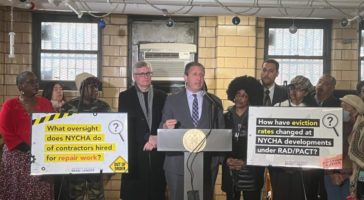
Comptroller Lander, Committee members and residents join for the announcements of two new resident-advised NYCHA audits. Image Credit: Office of the New York City Comptroller.
On February 22, 2023, Comptroller Brad Lander joined New York City Housing Authority (NYCHA) residents to announce two new NYCHA-related audits. The first audit targets NYCHA’s repair process and the second targets eviction rates at certain developments.
The subject of the audits was determined by a committee of 21 NYCHA residents from all five boroughs. The committee was created last December to steer a “resident-powered audit” process since residents will have a better perspective of the ongoing issues in their buildings.
The first audit will analyze how NYCHA selects contractors for repair work, the quality of the repair work, and what evaluations are done. Auditors will examine the selection process and analyze the oversight NYCHA uses to ensure that repairs are done in a timely manner. Committee members and residents had discussed how repair tickets would frequently be closed without repairs being completed.
The second audit will examine eviction rates at RAD/PACT developments. PACT developments are in the Permanent Affordability Commitment Together program, which unlocks more funding and allows developments to receive enhanced property management, expanded on-site social services, and comprehensive renovations. By using the Rental Assistance Demonstration, an affordable housing preservation initiative, PACT developments are converted to Project-Based Section 8, a more stable federally funded program. The additional funding can be used to make critical repairs, quality of life, and sustainability improvements. The audit will examine the eviction rates in PACT developments, compare the eviction rates to before these developments were converted, and to see if reasons for eviction have changed.
While the Comptroller’s office is required to audit all city agencies every four years, NYCHA has been under much scrutiny over the past several years due to ongoing financial and management struggles. Previous audits from the Comptroller’s Office included a 2019 audit that revealed that NYCHA had wasted $3.7 million replacing eight roofs that were already covered under warranty and a 2020 audit that revealed inefficiencies in the work-order tracking system for heating complaints.
In December 2022, Comptroller Lander released the results of a survey of NYCHA residents for feedback about the audit process. Residents cited sanitation, safety, and incomplete or inefficient repairs as top concerns. The Comptroller’s Office conducted a field review of building entry doors in NYCHA developments, which revealed that almost 60 percent of doors were open or had broken locks, up from 23.5 percent of doors found in a similar review from 2018.
Comptroller Lander stated, “Residents are the experts on what is broken in their homes, and their insight is an integral part of the oversight process to ensure that NYCHA is meeting its obligations. Problems with the repairs process and concerns about rising evictions rose to the top in our conversations, and our auditors will be diving in on the details to understand what’s happening and what needs improvement. I want to thank the committee for their thoughtful feedback and collaboration and look forward to continuing this work together to improve conditions at NYCHA.”
NYCHA Resident Brenda Temple stated, “As the RAD/PACT program continues to expand to NYCHA developments, we as residents want to ensure that there is accountability and oversight of this program. I am grateful to Comptroller Lander for creating the resident committee so that our voices are heard throughout this process. City resources must be directed towards robust outreach to tenants in converted buildings to learn more about their experiences of RAD/PACT.”
By: Veronica Rose (Veronica is the CityLaw fellow and a New York Law School graduate, Class of 2018.)

